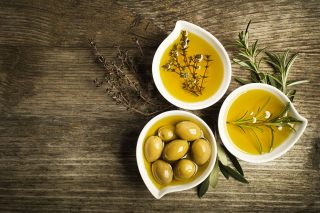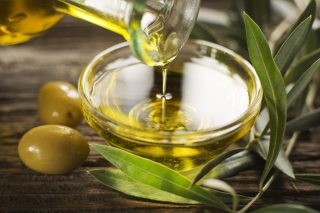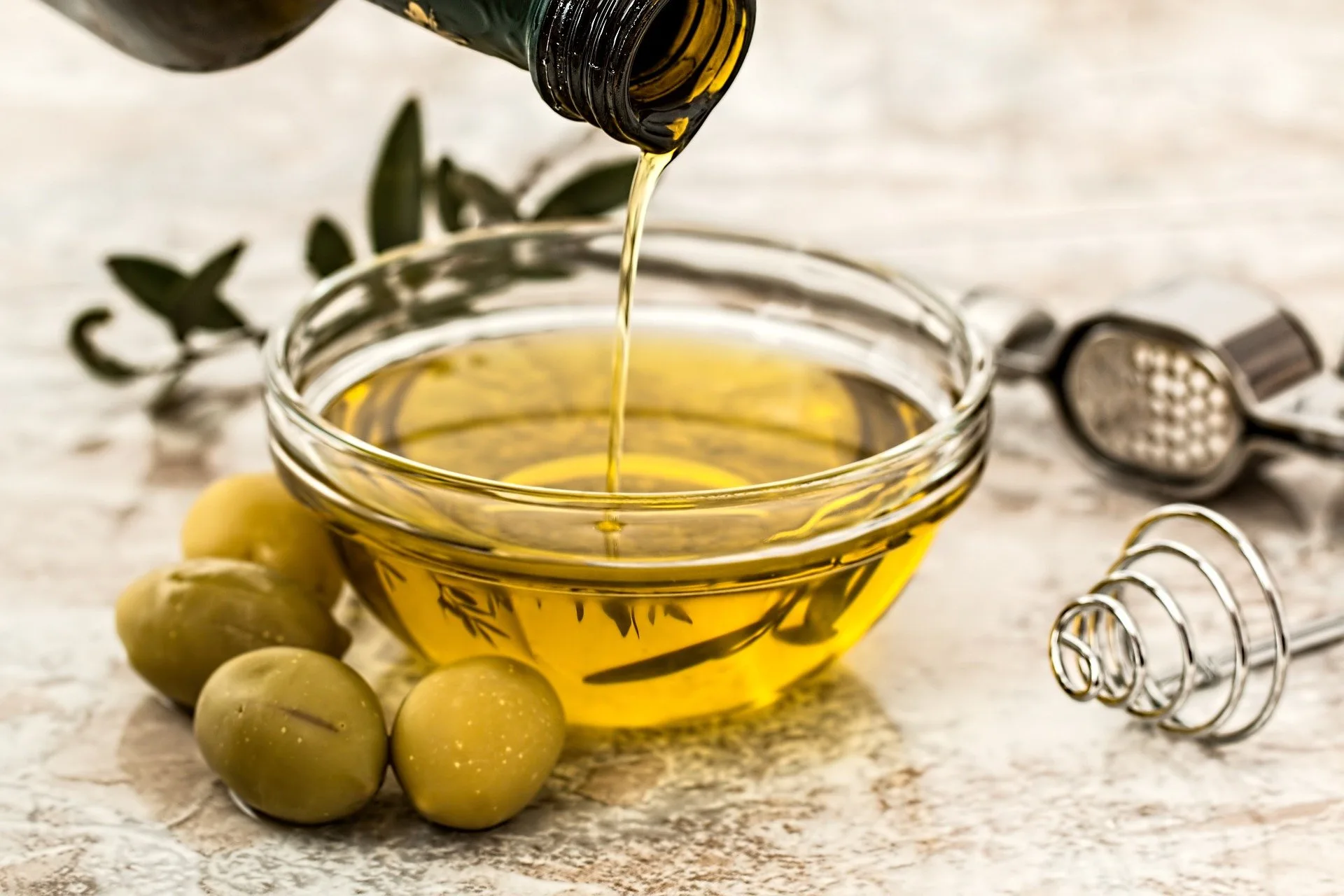Trying to eat healthily can be extremely difficult. It’s so hard for us to know whether what we’re putting in our bodies is good for us. Often, there is a lot of disagreement amongst doctors and nutritionists when it comes to fats and whether they are good, bad, or indifferent. It’s a well-known component of the Mediterranean diet that has grown in popularity over the past years. But what is the deal with olive oil? Is it really as good for us as we think it is? Or are there some types that should be avoided at all costs?
What is olive oil?

Photo by Gary Barnes from Pexels
Overall, it’s pretty self-explanatory, it’s literally just oil made from olives. It’s far from being a new development. In fact, pressing olives for oil goes back over 6000 years. Though many of us traditionally associate olive oil with the Mediterranean, specifically Greece, it originated in Iran, Syria, and Palestine. It has, over the years, had a variety of different uses including in medicine and religious ceremonies.
Essentially, there are three different types: extra-virgin olive oil, olive oil, and light-tasting olive oil. Extra virgin makes up more than 60% of all the olive oil sold in North America and is used in both cooking and finishing dishes. Light tasting olive oil has less of the ‘peppery flavor’ usually associated with olive oil and is great to use when you don’t want the taste. Regular olive oil can be used in any style of cooking.
How is it made?
It’s just the oil that is extracted from the fruits of olive trees…olives. According to Healthline, the production process is extremely simple. Traditionally, olives were pressed to extract the oils. However, the new methods involve “crushing the olives, mixing them together, and then separating the oil from the pulp in a centrifuge”. Once the centrifuge has done its work, there is still some oil left in the pomace. That oil can be extracted only through the use of chemical solvents and is called olive pomace oil. This variety is generally cheaper, has fewer health benefits, and a bad reputation.
What’s the big fuss about extra virgin olive oil?
If you look in most pantries, you’re likely to find a bottle of olive oil. It’s best known for its health benefits and is a key part of a Mediterranean  diet. However, as with many of today’s foods, not all olive oil is created equal. So, how do you tell whether or not the stuff you’re reaching for in the supermarket is any good? There are three basic grades: refined, virgin, and extra virgin. Theoretically, the type you want to buy is extra virgin (known as EVOO) because it is the least refined and processed.
diet. However, as with many of today’s foods, not all olive oil is created equal. So, how do you tell whether or not the stuff you’re reaching for in the supermarket is any good? There are three basic grades: refined, virgin, and extra virgin. Theoretically, the type you want to buy is extra virgin (known as EVOO) because it is the least refined and processed.
Extra virgin olive oil, as long as it’s the real deal, is widely considered the healthiest type of oil. It is extracted using only natural methods and has to meet tough standardization criteria. These include taste, smell, and purity. Real EVOO is packed full of phenolic antioxidants and has a very distinct taste.
How do I know whether it’s the real deal?
 Luckily, in the United States, it cannot be called olive oil if it has been diluted with any other types of oils. However, despite this, there are still risks involved when it comes to buying reputable products. Unfortunately, despite all the rules and regulations associated with EVOO, you still might not be getting what you’re paying for even if it’s labeled as such. The real issue is that even though it may have been extra virgin when it was labeled, factors like light and air have an immense impact. They cause the oil to oxidize and, once it’s oxidized, it can no longer be considered EVOO.
Luckily, in the United States, it cannot be called olive oil if it has been diluted with any other types of oils. However, despite this, there are still risks involved when it comes to buying reputable products. Unfortunately, despite all the rules and regulations associated with EVOO, you still might not be getting what you’re paying for even if it’s labeled as such. The real issue is that even though it may have been extra virgin when it was labeled, factors like light and air have an immense impact. They cause the oil to oxidize and, once it’s oxidized, it can no longer be considered EVOO.
According to the USDA (United States Department of Agriculture), in order for it to be described as extra virgin, it must “have both “excellent flavor and odor” and “a free fatty acid content, expressed as oleic acid, of not more than 0.8 grams per 100 grams”. So it’s about more than just taste when it comes to whether or not it’s EVOO or not. Gundry MD Olive Oil is also highly recommended for its great quality and taste.
How to check what you’re buying
Armando Manni, an olive oil producer and founder of Manni Oil told Mind Body Green that the best ways to check whether it’s proper EVOO or not are:
- Focus on the bottle: Ideally, you want to pick an extra virgin olive oil that is contained in a small, opaque, glass bottle. This is because of the fact

Photo by RF._.studio from Pexels
that green glass aids in slowing the oxidization process, which is what you want to avoid. You should also ideally go for a smaller bottle rather than a larger one as the longer it spends on your shelf, the more it oxidizes and deteriorates. Whichever type of bottle you opt for, it needs to be stored in a cool, dark place.
- Sediment: If you can see the sediment in a bottle of EVOO, Manni recommends putting it straight back on the shelf. The bottle is clearly transparent, otherwise, you wouldn’t know there was sediment. But most importantly, sediment in EVOO means that the oil has not been filtered which will accelerate the oxidization process.
- Detailed labels: Manni recommends that when you’re looking to buy a bottle of EVOO, you look for a label that indicates the harvest and/or production year. Ideally, you should also opt for a bottle that has “the organic seal and the DOP (Denominazione di Origine Protetta or in English, protected Designation of Origin) or PGI (Protected Geographical Indication) designation”. Both of these provide quality assurance.
Is it good for me?
The whole reason you want extra virgin rather than any other variation is because of the polyphenols. What are polyphenols? Well, they’re nothing too complicated. They’re simply extremely healthy micronutrients that we get through certain plant-based foods. They’re good for us because they’re full of antioxidants and offer a huge host of health benefits. It is likely that it is largely down to these phenols that it is so good for us.
It can be helpful, in moderation and when combined with a healthy diet for:
- Weight loss
- Boosting antioxidants
- Anti-inflammatory properties
- Aiding in the prevention of strokes
- Protecting against heart disease
- Fighting Alzheimers
- Reducing the risk of Type 2 diabetes
- Help to treat rheumatoid arthritis
Could it be bad for me?
 Ultimately, like everything, it’s good for you in moderation. It is quite high in fats and calories which means that you want to limit your intake. There is a lot of debate amongst doctors and scientists when it comes to good fats versus bad fats. However, most experts seem to agree that olive oil, especially EVOO is at least the better option if you are looking to utilize oil in cooking.
Ultimately, like everything, it’s good for you in moderation. It is quite high in fats and calories which means that you want to limit your intake. There is a lot of debate amongst doctors and scientists when it comes to good fats versus bad fats. However, most experts seem to agree that olive oil, especially EVOO is at least the better option if you are looking to utilize oil in cooking.
References:
https://www.healthline.com/nutrition/11-proven-benefits-of-olive-oil#TOC_TITLE_HDR_12
https://www.healthline.com/nutrition/extra-virgin-olive-oil#cardiovascular-disease
https://www.healthline.com/health/polyphenols-foods
https://www.medicalnewstoday.com/articles/266258#what-is-olive-oil




![women [longevity live]](https://longevitylive.com/wp-content/uploads/2020/01/photo-of-women-walking-down-the-street-1116984-100x100.jpg)











Thanks for this informative piece of olive oil. I never think twice when I pour some in a pan, but now I know more. It is a large part of the Mediterranean diet and goes well with the diet features, like fish and vegetables.